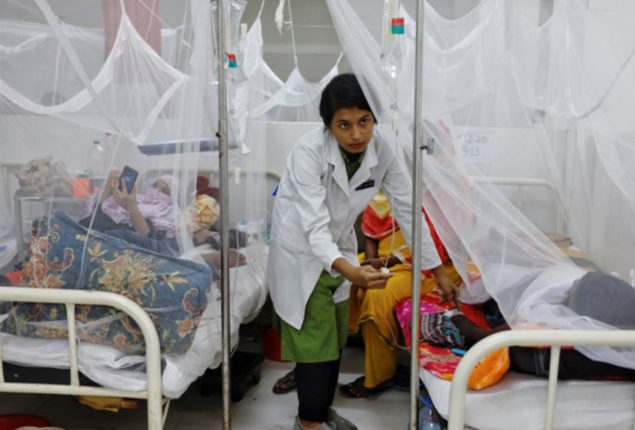Kim Unveils Spy Satellite Snaps of White House, Pentagon
Kim Jong Un views White House, Pentagon, and U.S. carriers via spy...

Bangladesh Hit by Deadliest Dengue Wave, Toll Reaches 1,600
Bangladesh is currently grappling with its most severe dengue fever outbreak to date, with the annual death toll reaching 1,606, as per official reports released on Monday.
Dengue poses a recurring health threat during the monsoon season, typically spanning from July to September.
The Directorate General of Health Services reveals that this year has seen over 309,000 individuals infected by the virus, transmitted by Aedes mosquitoes breeding in freshwater pools and drains.
This death toll marks a historic high since record-keeping began in 2000, representing an alarming increase of almost six times compared to the 281 fatalities recorded last year.
Health experts are expressing heightened concern due to the prolonged duration of this year’s outbreak, as dengue infections typically decrease with the conclusion of the monsoon rains. Despite the usual trend, the country has reported nearly 38,000 cases in November alone.
“Despite the decreasing number of patients now, we did not record any dengue patients in this period in previous years,” Md. Sharfuddin Ahmed, vice chancellor at the Bangabandhu Sheikh Mujib Medical University in Dhaka, told media.
Unlike past outbreaks, which typically occurred in densely populated urban centers such as the capital, Dhaka, home to over 23 million people, this year’s surge has been observed across a broader geographical range, extending into rural areas.
“This year the dengue outbreak was recorded across the country, which didn’t happen in previous years,” Ahmed said.
This year, over 65 percent of reported cases originated from locations outside Dhaka, marking the first instance where the city did not constitute the majority of infections, as indicated by the data.
“Considering the overall situation, the management of dengue is a bit problematic in our country. If people went to the doctor on time and received early treatment, we could minimize the number of deaths,” Ahmed said.
Muzaherul Huq, a former regional adviser for the World Health Organization and a public health expert, suggested that the prolonged dengue season is probably associated with climate change.
This connection is attributed to the increasing temperatures and lengthening monsoon seasons.
“Dengue season shouldn’t continue for such a long period,” he told media.
To prepare for future outbreaks, the Bangladeshi government must enhance the dengue control mechanism and actively engage the public.
This involvement should include raising awareness and implementing measures to control mosquitoes carrying the dengue virus, emphasized Muzaherul Huq, a public health expert.
Additionally, given recent indications of shifts in disease patterns, he stressed the necessity for increased research efforts.
“We need to have further research to comply with the reported disease pattern changes of dengue.”
Catch all the International News, Breaking News Event and Latest News Updates on The BOL News
Download The BOL News App to get the Daily News Update & Follow us on Google News.